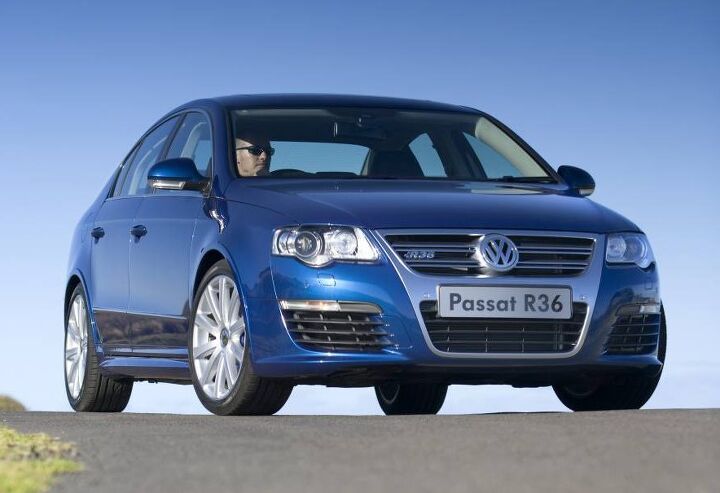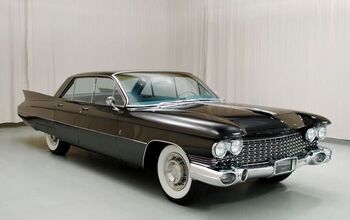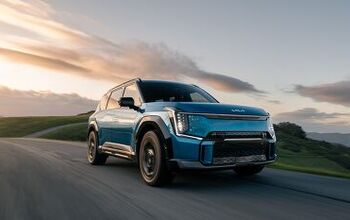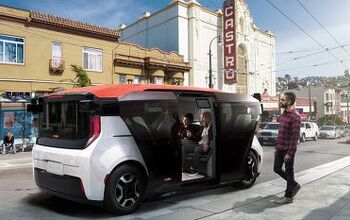Volkswagen Needs A Hot Passat - Once Again

Is there anybody left in this country who gives a single damn about Volkswagen? If so… why?
This is a company that has spent the past 40 years treating their American customer base with the kind of contemptuous disdain that most of us associate with the wait staff at Le Bernardin. The thousand injuries of Wolfsburg we have borne as best we could — from the Westmoreland Rabbits to the 8-valve Mk2 GTI to every single aspect of the Phaeton ownership experience — but when the company ventured upon insult to the very air we breathe, that should have been enough for all of us to abandon the brand permanently.
The problem is that some of us just can’t let go. Maybe it’s misplaced loyalty. Maybe it’s dim memories of the Corrado VR6. Maybe it’s just a certain delight in the way that Volkswagens feel when you’re driving them. Whatever the reason, there’s still some goodwill left in the United States on which the company can capitalize. One of the ideas being floated is a “hot Passat”, or at least a slightly sportier Passat. Our own Steph Willems made the case earlier in the week that such a car would be a waste of time.
I disagree, and I’ll tell you why.
Twenty years ago in this country, VW was well on its way to becoming a minimal-volume niche brand like Volvo or Saab. Its showrooms were dead-quiet reliquaries of eclectic and unwanted adjunct-professor-bait like the five-cylinder “EuroVan” and the Jetta Trek. We didn’t even have a true GTI; in a thoroughly typical display of contempt for the New World, Volkswagen put the GTI badge on the pig-nosed VR6 for American consumption.
What happened next was nothing short of a renaissance. The MkIV (pronounced “Emm-Kay-Eye-Vee” by certain idiots on VWVortex who think they are making hilarious fun of other idiots on VWVortex) Golf and Jetta created a whole new generation of VW loyalists overnight. Virtually the entire VW “scene” as we know it now comes from the cars that VW introduced right before the turn of the millennium. The aggressive cost-cutting by Dr. Piech and his hired guns sacrificed long-term quality in favor of rich-textured showroom appeal, but by the time everybody figured out what junk the cars truly were, they’d already been seduced by the miniature-BMW feel and inexplicable snob appeal of the VW brand.
Yet it wasn’t the 1999 GTI that heralded VW’s return to form. Rather, it was the Audi A4-based Passat that debuted the year before. The B5 Passat was an utter revelation, offering the freeway poise of a C-Class, the interior space of an E-Class, and the dynamic vigor of a BMW 323i at the MSRP of a Camry LE. Like the Golf and Jetta that followed it, the quality wasn’t really there, but to a generation that had been raised in Chevrolet Celebrity Eurosports and the like, the sheer visceral delight of entering an on-ramp behind the big soft-touch wheel of a Passat V6 was worth any amount of service-department misery.
The goodwill, loyalty, and upscale image created by the Passat, Golf, and Jetta in those first few years after 1998 seemed impossible to destroy — but only a fool would bet against VWoA’s ability to destroy its own brand. After all, this was the company that, much like the legend of the phoenix in reverse, had managed to return from flaming majesty back to the ashes multiple times from 1960 to 1998. So the MkIV was replaced by the underwhelming, cheap-feeling MkV and a series of completely inept marketing campaigns. The B5 Passat gave way to the completely uninteresting B6 Passat, and when the American market declined to worship at the feet of a car that was somehow both worse to drive and considerably more expensive than its predecessor, VW’s response was to call its most patient customers ignorant hicks and give them a parody-Passat that resembled nothing so much as a bigoted German’s off-handed libeling of the 2003 Camry given actual sheetmetal form.
And that’s where we would be now — with an aging lineup in which the current GTI is perhaps the only truly outstanding product, but which is also priced in a manner that can only be described as “feverishly optimistic” — except that there’s also this little matter of Volkswagen knowingly deceiving the American public for several years. Given the general attitude of contempt which the adjunct-professor crowd treats any mention of the United States, perhaps VW can be forgiven for thinking that it could win the public-relations war between themselves and the EPA. The problem is that there are two kinds of Americans nowadays:
- People who love this country and believe in it
- People who take the EPA very seriously
And somehow VW managed to pull off the heretofore-impossible feat of pissing both groups off at the same time. The self-consciously patriotic crowd is angry because a bunch of Germans abused the trust placed in them by a government agency that tended to adopt a test-it-yourself method. The snail-darter sympathizers are utterly aghast that Volkswagen has knowingly pumped millions of pounds’ worth of pollutants into the air. Right now, you could probably get Hillary and Trump to denounce Volkswagen. That’s how bad the situation is.
So. In a situation like this, you have to go to the mattresses. By that, of course, I mean that you hunker down and fight with every weapon at your disposal until the storm has passed. You should know that. Didn’t you read The Godfather? VW doesn’t have a lot of weapons at its disposal, but they do have one card they can play, and that is the pandering-to-the-VW-enthusiast card. There are still a lot of people out there who believe in the company and the brand. Embarrassingly, I’m one of them, my experiences through a half-million dollars’ worth of new Volkswagens notwithstanding.
This is what you do. You revamp everything you’ve got to be as maximum-aggression, as Autobahn-focused, as stereotypically German as possible. That means deep bumpers, V-Tex interiors, shockingly low prices, and home-market aesthetics. And just like in 1998, you lead with a Passat that attracts auto enthusiast’s attention. There’s no new metal on the horizon, but it would be possible for VW to deliver a heavily bespoilered V6-powered Passat with as much power possible for as little money as possible. Leave out the nav systems, the leather interiors, the sound insulation. Build a Passat that out-handles and out-accelerates competitors from Hyundai and Kia. Give it a manual transmission.
Then market the hell out of it. Make sure it’s on TV and on the Internet ripping up to 165 miles per hour in the left lane of a derestricted six-lane to Frankfurt. Make it all black with red trim and all white with white trim and make it look so aggressive that the current C-Class and 3 Series look like bloated, curvaceous boats by comparison. The furious purpose of this vehicle should be apparent from a Google Maps satellite.
Will a lot of people buy it? Of course not. But selling the hyper-Passat will do a few things: It will reassure the faithful. It will help people forget about the TDI and the “green police” business. It will re-position the brand back to where it was in 1999. And the same treatment can be applied to the Jetta six months down the road to seal the deal.
Most importantly, it will show VW’s confidence and commitment to the American market at a time when a lot of potential buyers have good reason to doubt both of those qualities. It will shine some halo light on the more prosaic offerings and it will wipe some of the tarnish off the Volkswagen logo. In short, it will fly the flag just when it needs to be flown.
Would your humble author, veteran of many a new-Volkswagen delivery and many a 30-day stint in a service loaner, pay his own money for such a car? Not a chance. VW lost me as a buyer the moment they decided to extract a couple grand’s worth of profit from a flawless lease return back in 2009. But that doesn’t mean that other loyalists won’t step up to the plate. All VW has to do is make the pitch.

More by Jack Baruth
Latest Car Reviews
Read moreLatest Product Reviews
Read moreRecent Comments
- AZFelix The last time I missed the Malibu was when one swerved into my lane and I had to brake hard to avoid a collision. 1 out of 5⭐️. Do not recommend.
- 2ACL I won't miss it; it was decent at launch, but in addition to the bad packaging, GM did little to keep it relevant in the segment. I'd prefer that another domestic automaker doesn't just give up on the mainstream sedan, but unlike some of Ford's swan songs, the Malibu made an indifferent case for why they should live.
- ToolGuy TG grows weary of purchasing gasoline. I don't care so much how or why, I am just tired of it. I still buy petroleum products, not 'boycotting oil,' but backing away from gasoline where I can. Sample size = 1.
- Probert Maybe it's not too late for the Dodge Neon I've always dreamed of!!! To the keyboard Robin!
- Akear The malibu still outsells all GM EVs combinedMalibu -150,000GM EV's - 75,000Maybe this represents how execrable GM EVs really are. Barra should have resigned years ago,


































Comments
Join the conversation
Jack, this is the single smartest article I have read about what VW did to itself. Key points worth emphasizing: 1) They attracted hordes of new buyers with incredibly appealing -- and beautiful driving -- cars like the '98 Passat and '99 Jetta. Then they kicked all those potential new faithful right in the nuts with shockingly bad durability, quality, and reliability, and didn't take one ounce of responsibility for it out of warranty ( sometimes not even in warranty). 2) They had a way better chance selling cars that felt and drove 20% better than the competition for 10% more money, than cars like the current Jetta and Passat that are as boring as the competition (and feel flimsier) -- for 9% more money. Your suggestions for them make great sense. They won't do it, of course, and their spin is now probably unrecoverable anyway, so that's that.
It couldn't be just another 1.8L turbo automatic, with a thin warranty. Problem is, they need an affordable V6 option, or a Hyundai-like warranty. Otherwise, it's just an alternative to more reliable Japanese competition. I don't mind the styling, other than a few generic Chevy touches (grill, rear quarter window). Back in the B5 days, the Passat really was an A4, with less to go wrong, but still temperamental like it's European counterparts. There was an enthusiast following because it was a true sports sedan, albeit high strung for city driving in US traffic conditions. On the good side, entry level Passats (and Jettas) are now dirt cheap in real world purchasing prices. I searched online for my parents, to replace an aging Acura TL. Got quoted $17.8 for a Passat, including all the nuisance fees, everything but sales tax, out the door. Online quote for a Jetta (manual) was $16.1, and with an email or two, I found it could be hand for around $14.3. We're talking Kia Rio and Nissan Versa prices here. These cars are a steal at prices like that, whatever happens to VW in the US.